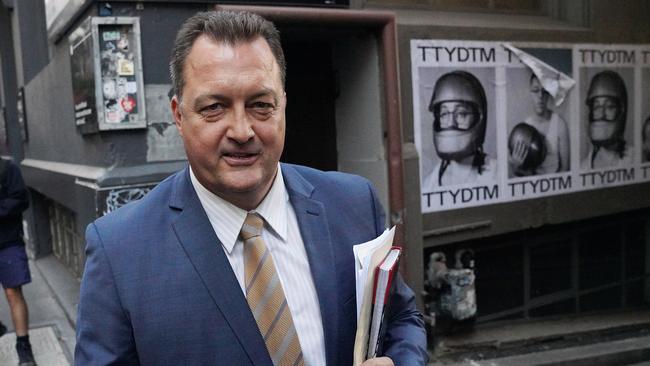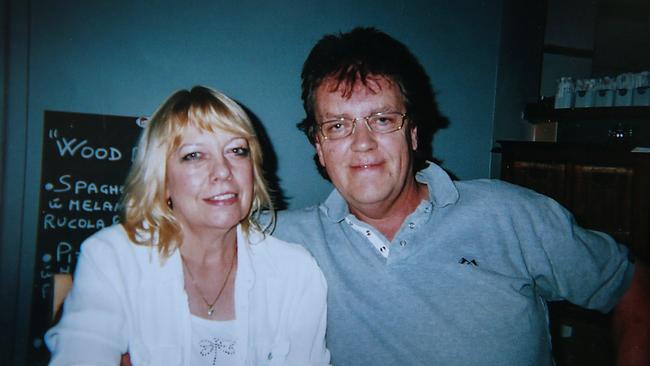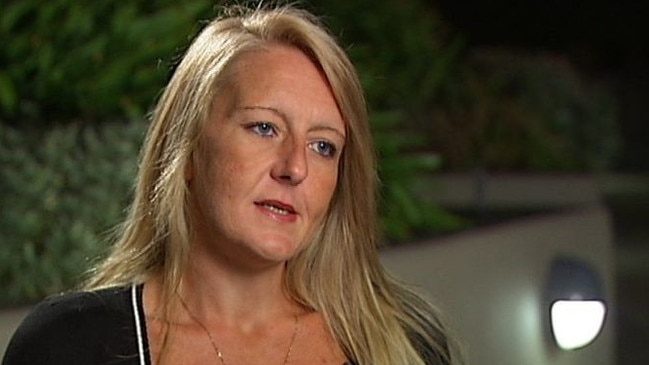In the frame with Lawyer X
In jail with the very men he’d investigated, targeted cop Paul Dale believed only Nicola Gobbo could save him. How wrong he was.

Paul Dale is a former Victorian drug squad detective who worked closely with police informer Terence Hodson. In 2003 Dale, Hodson and another detective, David Miechel, were accused of stealing ecstasy pills worth $1.3m from a drug house run by gangland figure Tony Mokbel.
Hodson agreed to give evidence against his accomplices, but in 2004 he was killed execution style, along with his wife, Christine. The robbery charges against Dale were dropped but Miechel was jailed for 12 years.
In 2009, Dale was charged with Hodson’s murder, allegedly organised through gangland figure Carl Williams and carried out by a hitman. In 2010, Williams was murdered in prison and the murder charges against Dale were dropped.
Last year, Dale told the Royal Commission into Management of Police Informants that he had been illegally set up by members of Victoria Police and “Lawyer X” Nicola Gobbo when she secretly recorded a conversation with him before he was charged over the murder of criminal informer Hodson.
Here, Dale tells of the arrest and the start of his association with Gobbo.
-
Detective Senior Sergeant Murray Gregor from Ethical Standards was the one who knocked on my door at 5.45am on Friday, December 5. He was accompanied by a bunch of other detectives. I’d been on leave for a week or two and I was due to return to work that day. My wife answered the door and led the horde of police officers into the kitchen.
As Gregor handed me the search warrant and read me my rights, alongside the shock I registered the thought that reading someone their rights as soon as you walk through the door — before you had even said why you were there — was unusual. It meant that they were going by the book.
While Gregor stayed with me, the other detectives began searching my house. They went into my closet and took my police uniforms — taking back police property was a pretty good indicator that their minds were made up before they even entered the door. It didn’t matter what I said in my defence. Gregor told me that I was under arrest for conspiracy to commit burglary and theft, and conspiracy to traffic a commercial quantity of a drug of dependence.
All on the word of police informant Terry Hodson — a guy who’d sell his own grandmother.
Not only was being arrested in my own kitchen on an uncorroborated statement from a criminal beyond belief, it was really bad investigative work. Even from a legal point of view, you can’t convict a co-accused on the word of someone else charged with the same crime. But that’s all they had.
I was taken into the ESD (the Ethical Standards Department of Victoria Police) offices at the Melbourne World Trade Centre and at 7.30am sat opposite Gregor and another detective in an interview room. Gregor fired questions at me about how I’d conspired with detective Dave Miechel and Hodson to rob the Dublin Street house. I denied all allegations. While they questioned me, I was asking a set of my own questions in return. Them: “We put it to you, Mr Dale, that you …” Me: “Who said that?” “Where did this come from?” “Someone’s obviously told you this crap.” “Now, if … Hodson’s told you this stuff, the only thing I can think of for him to say something like this would be to try and benefit any sort of problems he may have. I don’t know whether he’s got any problems, but … why would they tell you this? Why would they try and say I had any involvement in this whatsoever?”
I could tell that they were uncomfortable. They also looked embarrassed because when I asked for the source of their information we all knew there was only one source. And it wasn’t a reliable one. Hodson.

At about 8.15am, Gregor announced that he was going to suspend the interview. Just after 11am I was taken to the Melbourne Custody Centre until my appearance with Hodson and Miechel before a magistrate in the Melbourne Magistrates Court. While I never saw Hodson, I was put in a cell with Dave. My first words were shouted: “I know why you’re here, but what the f..k am I doing here?” “Dunno,” he said with a shrug. He wouldn’t look me in the eye. Which wasn’t unusual. But he let me rant until my fury was spent. Two cops together in a cell. Both of us were aware that every breath we took, every word we spoke, would be fully monitored, so after my initial rant we settled into a silence, broken only by small talk.
My anger at Dave delayed my reaction to being put in a prison cell. Had Dave not been there for me to yell at, I would have looked around the bare concrete walls and at the bare concrete seat and looked over at the stainless steel sink and dunny and panicked. After I calmed down, my delayed response kicked in. I began to tremble. A cop in a cell. A very dangerous place. In the blink of an eye my world had turned upside down. I was supposed to lock up crooks, not be locked up.
And despite a long history of locking up crooks, my work stopped when their cell door shut. I had no idea about the other side of the cell door. And now I was finding out.
Closing the net
My first thought after my arrest was that I needed Nicola Gobbo — I wanted the best. When I first met Gobbo, she was one of the highest profile barristers around. Her list of clients read like a who’s who of the Melbourne drug trade. When people found themselves on the wrong side of large-scale drug charges, Gobbo was their lawyer of choice. She handled most of the big drug cases, and I had been charged with conspiracy to traffic large quantities of drugs — one of the most serious drug charges on the books, carrying a maximum sentence of life in prison.
I rang her from the ESD offices. I had no idea at the time that she was acting for Hodson’s son Andrew and had taken on Terry and liaised for him to come in. She would have known full well that to liaise with Ethical Standards could only mean that Terry was cutting a deal. To then agree to meet with me as my lawyer and pretend she was there for my best interests was crazy. I had no idea that she was helping Ethical Standards close a net around me.
As well as Gobbo, I had access to Tony Hargreaves, who had the contract with the Victorian Police Association; he had been the preferred police lawyer for 20 years. So as much as I needed Gobbo, I also needed the Police Association to fund my legal case, and Hargreaves had a terrific reputation. I had to try to get bail and get myself out of this situation.

Gobbo and Hargreaves met with me at the Custody Centre. Their legal advice was not to make a premature bail application. They said that if bail was refused it could take months to get another hearing, which meant months in jail. They said we should wait and see what the police case against me was, then counter it. Here was I incarcerated, and at that moment the two people I trusted most in the world with my freedom were Gobbo and Hargreaves. As difficult as it was, I took their advice and was remanded into custody into the Port Phillip Prison.
The first visitor I had was Gobbo, who came as my lawyer. I couldn’t have any other visitors until my visitor list was approved. For the uninitiated, a visitor list has to be compiled and OKed, then the prison does a background check on each person on the list, then contacts the police and also the people on the list to get their OK as well. The whole process takes time, but a lawyer doesn’t have to go through the process and can visit any time. Gobbo was a sight for sore eyes in those early days. She told me that she wanted to represent me and that she understood that the Police Association was funding Hargreaves’s work, but that she would do it pro bono. We both knew that my case was going to be high profile and I think Gobbo wanted to be a part of that. She offered to act as my barrister, working with Hargreaves as solicitor.
As we talked in the prison visitors’ room, Gobbo made notes about my bail application to take back to Hargreaves. She took all of my legal notes that I’d made in solitary confinement to take to Hargreaves. But she didn’t take them to him: she took them straight to her police handlers. I never followed up with Hargreaves because I never thought I had to. I only found this out later at the Royal Commission into Management of Police Informants last year.
Trapped like a rat
Ten days in a cell felt like a lifetime. I spent the stretch in the Port Phillip Charlotte Unit — which is the Port Phillip equivalent of Barwon Prison’s notorious Acacia Unit. Ten days. Twenty-three hours a day sitting in a cell with the only light of day coming through a tiny reinforced window that faced a brick wall. I was a physical person. I went to the gym most days. To lock someone in a shoebox where you could barely move. You couldn’t speak to anyone. You couldn’t go anywhere. Your food was passed through a slot in the door. Your anxiety levels went through the roof. No family. No human contact. No nothing. Except walls. And a boiling kettle.
A couple of years earlier, I had investigated a murder in this very unit. A guard had left a door open and an inmate had been bashed to death. I knew this kind of thing happened. Hence the constant boiling water. If that door opened I would not hesitate to throw boiling water at the person who walked through. Constant fight-or-flight mode and the attendant adrenalin rush gave you the jitters. Always on guard. Watching the door.
I lost 10kg in 10 days. Inmates howled like wolves for my blood. Dale? Dale? You’re a f..kin’ dog! We’re gonna kill you. Dale? Dale? I never answered.
Jury of police peers
Ten days later I was granted bail, and Hargreaves presented me with a $10,000 bill for his services, which I paid with money I borrowed from Mum and Dad. I would be reimbursed if the Police Association took on my case. This is why I decided not to solely use Gobbo as my lawyer. The Police Association didn’t just take on any member’s case: there was a whole set of criteria that needed to be filled before you made an application. The panel examined the case against you, questioned you, and then made a decision if the case against you had merit. In other words: if they thought you were guilty, they wouldn’t fund your case. I followed this process and the Police Association agreed to fund my case.
This was a huge lift to me — it meant that a jury of my police peers had read the brief and come to the same conclusion: that the case against me was not watertight. So I made the decision to go with the Police Association and use Hargreaves and whatever barrister he chose, and not to formally use Gobbo in court. I explained to Hargreaves that I would continue to seek her legal advice and he was fine with that. Gobbo was happy with that arrangement, too.
The biggest difference between the two was that Hargreaves was always official and businesslike. My relationship with Gobbo was very different: she would catch up for a chat and was always available for advice. That was the way she operated. She feared that her office was bugged, so she never met any of her clients there.
Because we always met at restaurants and coffee shops, the police would later put a spin on our relationship, saying that it wasn’t a legal one because of the places we met, but she met all of her clients in those sorts of places. We never caught up just purely for social reasons; there was always a legal reason for our meetings, although over time we became friends and parts of our conversations would be social.
Later, I would be charged with talking to her about the Australian Crime Commission hearings, on the grounds she wasn’t my lawyer. But I was certainly under the impression she was acting as my lawyer and I had been seeking her legal advice, albeit on a pro bono basis, from the day I was arrested.
This is an edited extract of Cops, Drugs, Lawyer X and Me by Paul Dale and Vikki Petraitis, published by Hachette. Out Tuesday.

To join the conversation, please log in. Don't have an account? Register
Join the conversation, you are commenting as Logout